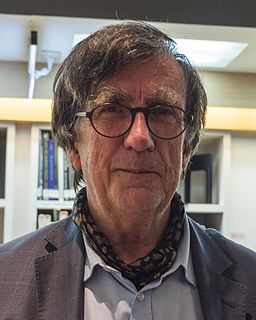A Quote by Bruno Latour
My interest is that there is a disconnect between the science and the size of the threat that people mention about nature, the planet and the climate, and the emotion that this triggers. So we are supposed to be extremely frightened people, but despite that we appear to sleep pretty well.
Related Quotes
I don't like to claim that I am an expert on anything, but I have enough knowledge about climate science and climate system to be able to write scientific papers and go to meetings and talk about monsoon systems and talk about any other things that you want to discuss about climate science issues. I'm as qualified as anybody that you know on this planet on this topic.
Despite the international scientific community's consensus on climate change, a small number of critics continue to deny that climate change exists or that humans are causing it. Widely known as climate change "skeptics" or "deniers," these individuals are generally not climate scientists and do not debate the science with the climate scientists.
Despite the fact that I trust the people at major labels who tell me that they want to offer me a home as a "stable artist," who can just do what he does for the long haul, time has shown that it rarely works out that way - the bottom line is the bottom line, not mention the threat of mergers and firings and whatnot, and people get dropped.
Foreign policy is now a huge field. It isn't just people who are studying political science. There are so many aspects to it in terms of understanding hard science for people who are studying climate change, or people who are interested in health policy or food security, or people who care about education.
There are loads of sociopolitical, racial, class and future-planet situations that really interest me, but I'm not really interested in making a film about them in a film that feels like reality because people view that in a different way. I like using science fiction to talk about subjects through the veneer of science fiction.
Though we feel extremely connected through all this technology [social networks], there's also this disconnect that happens. Because you're not actually talking to anyone. You're not actually meeting them for coffee. To me, social media is about "you". It's like, "Well, twenty people like this thing I said", so that's about me.
I read somewhere that everybody on this planet is separated by only six other people. Six degrees of separation between us and everyone else on this planet. The President of the United States, a gondolier in Venice, just fill in the names. I find it extremely comforting that we're so close. I also find it like Chinese water torture, that we're so close because you have to find the right six people to make the right connection... I am bound, you are bound, to everyone on this planet by a trail of six people.
Some people say, "Sometimes I have violent thoughts, what can I do?" So I say, "Well, have them!" Cos we should not try to control ourselves. It's very bad to control ourselves in this sense. If you have any emotion at all, if its a bad emotion or good emotion, think about it, you should just understand that you have those emotions. And it's good because we are people and we have all these emotions. And the result of that is you would become more and more peaceful. If you don't let those emotions be inside of you then you become extremely violent.
I, for one, despite being a pretty solid climate hawk, I am extremely sympathetic to West Virginia and its coal-country needs. I lived there for a year. I've seen it. And the same for Wyoming, Ohio, Pennsylvania, Kentucky. They all have parts of their state where that really matters. And I think that home-state constituency issue is a pretty constant one. And I think the problem of extreme lobbying by the corporate sector, which runs about $30-to-$1 compared to everybody else in the world, and the constituent aspect combines to give those industries a consistent advantage.




































